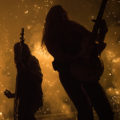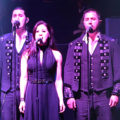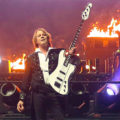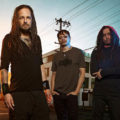Trans-Siberian Orchestra discusses “Letters From The Labyrinth,” and naturally, a new Christmas tour
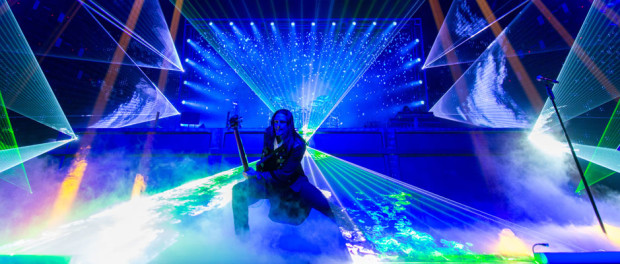 Photo provided by Jason McEachern
Photo provided by Jason McEachern
Progressive/symphonic/metallic rockers Trans-Siberian Orchestra may be the modern day rulers of Christmas music, but the massive troupe is steadily being recognized for its non-seasonal song cycles. Thus far, 2000’s “Beethoven’s Last Night” and 2009’s “Night Castle” were both centered around completed stories and concepts, though the brand new “Letters From The Labyrinth” (Lava Records/Republic Records) takes a unique twist on the band’s always ambitious songwriting formula. Chicago Concert Reviews recently joined TSO creator, lyricist and composer Paul O’Neill for a teleconference conversation about how the project bridges “the wisdom of the past and the hopes for the future,” plus the group’s massive return to the road performing select new tunes alongside “The Ghosts Of Christmas Eve” in all its production-stacked splendor.
Because of the success of the [Christmas] trilogy, no matter what is going on, when October rolls around, you shut down the studios, you shut everything else down. Everybody heads off to an arena and we just start to put together these humongous, Pink Floyd productions.
Let’s start with an overview of “Letters From The Labyrinth.”
Paul O’Neill: “Letters From The Labyrinth” is a major change from the way TSO creates new works. It’s the first album that’s not built around a completed story. Instead, it’s a collection of completed songs that have, basically, left the safety of the studio where they were born. The stories will emerge from their combined journeys. Just as TSO was designed to be a constantly evolving, morphing band over the decades, “Letters From The Labyrinth” is our first album where we’re experimenting [and] we’re calling it an open-ended album. Like our own lives, the story will develop and evolve. We’re not really sure what’s going to happen tomorrow, let alone next year.
The initial release that everyone receives includes the very first and the last short stories. The opening short story, “Time And Distance (The Dash),” is basically, how we’re all given a certain amount of time on Earth, but we’re not told how much time that is or how we should use it. Each individual has to figure that out for themselves, but it’s also easier to make journeys if you have multiple people with you, not unlike Chaucer’s “The Canterbury Tales.” We included the very last story, “The Dreams Of Fireflies,” which is basically a bedtime, go to sleep tale. It just sends you into dreamland where you have happy dreams, not nightmares, [and] you take on the world after that.
What kind of different itches get scratched by writing a story versus writing a piece of music?
O’Neill: With TSO, originally, the whole plan was to be rock opera-driven, and eventually we would do one or two regular albums. We simply never got around to it. We toy with the idea of making this a regular album, but I have gotten so used to the story adding an additional element to it, a third dimension, that I couldn’t quite let it go. I decided, “let me write just one short story to go with this one song,” and I’m like, “oh, let me write another short story.” We just basically decided that we would make this a series of short stories that were all interweaved as time goes by. It’s just a whole different way of approaching it.
When I have the story written, I know emotionally where each song should go, I know where the melodies should go, the balance, the dynamic. This is a new action adventure for us. Again, it’s not a rock opera. It’s not a regular album where it’s a bunch of songs. It’s kind of a hybrid, it’s something in between. It’s an experiment for us, and we’re not quite sure how it’s all going to work. In about a year, you and I should have a follow-up to this one.
How did your passion for history inform “Letters From The Labyrinth”?
O’Neill: The reason we picked “Letters From The Labyrinth” is the Labyrinth is on the island of Crete, built by the Minoans…The Minotaur was in the middle of this maze, so I think every one of these songs that is going to make a journey will send a message home. Letters tend to get lost in the mail, they sometimes go by different routes. When people discovered the Labyrinth that was buried for thousands of years under ruins on Crete, it was filled with all kinds of messages from the past. The Terracotta Warriors, which were buried for over two thousand years, [were] just recently discovered in China. There are all these little time capsules that give us hints to what our ancestors were trying to do, and so, we can see what they did wrong and we can see what they did right…

Photo provided by Mark Weiss
What can you tell us about this year’s show? Is there a theme?
O’Neill: Basically, there was three rock operas in the trilogy and after we did “The Christmas Attic,” all three of the rock operas had been performed live. Next year is the twentieth anniversary of “Christmas Eve and Other Stories,” so obviously, we’re going to do something big for that. This year, one of my managers said, “you know what, you’ve never done ‘The Ghost Of Christmas Eve,’ which originally we did in 1999 when we got a call from FOX who had a small, mini-movie drop-out on December 2nd. They asked us if they could film the band for an hour doing “Beethoven’s Last Night,” which we had just completed. I said, “if you give me an hour, I’ll give you a mini-movie. They’re like, “do you have a script?” and I’m like, “I’ll write it tonight.” I just quickly scripted together this little thing, where a fifteen-year-old ends up breaking into this old Vaudeville theater. She’s a runaway. There, she’s discovered by the caretaker, who uses the ghosts and the spirits from the theater to turn her life around. Thank God, FOX liked it.
They were able to get the legendary Ossie Davis to play the caretaker, and people like Jewel and Michael Crawford were kind enough to share their talents and play the ghosts. It was only supposed to run once and never again, but it did so well, FOX ran it multiple times. Then it’s basically run on various stations ever since. The DVD has gone multi-platinum. I’ve always liked it. It’s a little gem. It’s fun to watch it at home with your family, but live, there’s an excitement where you pick up the energy of the person in front of you, to the left of you, to the right of you. We decided if we were ever going to do “The Ghost Of Christmas Eve” live, it was this year or not at all, so we decided to go for it.
Chicago is one of the first cities that embraced the band. How did such an early acceptance at the club level help build a foundation for you guys to graduate to the arenas?
O’Neill: Actually, TSO is the first band to never play a club. We pretty much went straight to the theaters and then the arenas. Chicago is an interesting one. It did grow there very quickly. We love Chicago, it’s a great rock town. Funny story, I didn’t really appreciate how big a band we were there until we had sold out two shows in one day on a night when the Chicago Bears were playing out of town and the manager for the arena said, “Paul, you sold out two shows in one day when the Bears are playing out of town. I’m like, “wow, that’s great.” He goes, “Paul, you know what the Bears are?” I’m like, “yeah, they’re a football team.” And he goes, “no, no, no. The Bears are a religion” and he’s like totally serious. “The fact that you are able to sell out two arenas on a day when everybody is normally at home watching the Bears on TV just shows how big the band’s gotten.” Again, I’m not a super sports fanatic, like some people are, and I’d never looked at it from that perspective, but it made me appreciate it from another angle.
How do you make sure that the people coming to your shows are always seeing different wrinkles in the TSO arsenal?
O’Neill: Number one, we’ve just been very lucky. Not only have we had a constant inflow of new and young talent that has been developed over the years, but our crew is beyond belief great. From the pyro guys, to laser guys, to light guys, they’re the first ones in and the last ones out. If you have a great song, that’s great, but if you have great production where the lights and the lasers and the pyro and everything else is going off in time, off of one nervous system, it helps to take it to a whole other level.
Also, one of the reasons I tend to like the over-the-top production is it breaks down the wall between the band and the audience. I would love to say that it was part of our plan to write these three rock operas and that they would be humongously successful during the holiday season and we would take them out every November and December, but honestly, we were completely blindsided by the success of the Christmas trilogy. One of my agents said, “Paul you lucked into a Tchaikovsky meets Dickens.” I knew what he meant. Tchaikovsky was also blindsided by the success of “The Nutcracker.” He looked at it as just another ballet like, “Sleeping Beauty,” “Swan Lake,” and never dreamt that it would be as inter-woven into the holidays as it did become.
It’s an unbelievable honor and it’s very flattering. The little bit of a problem is that it throws off the natural rock rhythm. Writing is one mindset, you go into a zone and you write no matter how long it takes to create the album. The recording is a whole other different mindset. Touring is third mindset. Because of the success of the trilogy, no matter what is going on, when October rolls around, you shut down the studios, you shut everything else down. Everybody heads off to an arena and we just start to put together these humongous, Pink Floyd productions.
Basically at the end of every tour we start again, so that next year there’s something new for the eye. Human beings, we’re strange creatures. We like the comfort of the familiar, but we like the excitement of something new and different. Every year we feel the pressure to do that. But we’ve been very lucky in putting together a team that has the same vision in common. We all realize, the bottom line is, it’s all about the audience, to take everybody in that arena on a journey of their imagination where they’re not in that arena. They escaped and they feel emotions they never felt before. They leave that building recharged. Our biggest fear right now is that we never drop the ball.
Trans-Siberian Orchestra performs at the Allstate Arena in Rosemont at 3:30pm and 8pm on Monday, December 28. For additional details, visit www.trans-siberian.com, www.livenation.com and www.rosemont.com/allstate/.



